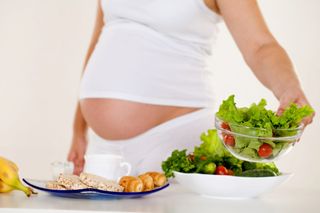High Cholesterol Levels May Make It Harder to Get Pregnant

Couples may have a harder time becoming pregnant if both the man and woman have high cholesterol levels, a new study suggests.
Researchers found that free cholesterol levels in men and women were higher, on average, among couples who did not become pregnant during the 12-month study than among couples who did conceive. (Free cholesterol is cholesterol that is not bound to another molecule; by contrast, HDL and LDL cholesterol is bound to proteins.)
The results also showed that couples in which the woman had higher free cholesterol levels and the man did not also took longer to become pregnant than couples in which both partners had normal cholesterol levels.
"We found a relationship between high free cholesterol levels and a longer time to pregnancy in couples," said study researcher Enrique Schisterman, a senior investigator at the Eunice Kennedy Shriver National Institute of Child Health and Human Development in Rockville, Maryland. [11 Big Fat Pregnancy Myths]
"This is the first study to look at cholesterol levels in both partners at the same time, and their influence on the probability of becoming pregnant," Schisterman said.
The findings are published onlinetoday (May 20) in the Journal of Clinical Endocrinology and Metabolism.
Cholesterol and conception
Sign up for the Live Science daily newsletter now
Get the world’s most fascinating discoveries delivered straight to your inbox.
In the study, the researchers monitored 501 couples in Michigan and Texas who were trying to have a baby and were not being treated for infertility. Nurses took blood samples from the women and men at the beginning of the study and measured the levels of five fats: free cholesterol, total cholesterol, phospholipids, triglycerides and total lipids.
During the yearlong study, 347 couples became pregnant. After evaluating the fat levels in each partner individually, and also using a couples-based approach, the researchers found a strong link between higher levels of free cholesterol in couples and their time to become pregnant.
This association held true even after the researchers took into account other factors that could influence fertility rates or lipid levels, such as the couple's age, education, body mass index (BMI), race and education.
Free cholesterol is not routinely tested in doctors' offices, but it is used in research. Cholesterol tests typically measure total cholesterol, lipoproteins (HDL and LDL cholesterol) and triglycerides.
The study suggests that cholesterol levels may be an important factor in healthy couples who want to conceive and who don't have infertility problems, Schisterman told Live Science.
Cholesterol might be related to fertility because it is a building block of both male and female hormones, he said.
These hormones, such as estrogen and progesterone in women and testosterone in men, play a role in a couple's ability to become pregnant. They influence the quality of men's sperm and semen, as well as ovulation, implantation and the maintenance of a healthy pregnancy in women, Schisterman said.
Health implications
The study findings have broad public health importance because the rate of high cholesterol levels and obesity is so high in the United States that even slight changes in the population, such as reductions in cholesterol levels or obesity rates, may affect couples' ability to become pregnant, Schisterman said.
He noted that maintaining healthy cholesterol levels is important throughout life, both when people are younger and hoping to start a family and as they get older and want to prevent heart disease.
One limitation of the study is that researchers had no data on participants' diets, which can influence lipid levels. However, they hope to include dietary measures in future studies.
"These are interesting preliminary findings," said Dr. Kim Thornton, a reproductive endocrinologist at Beth Israel Deaconess Medical Center and Boston IVF. "However, they can't be applied clinically until there are randomized trials to confirm or refute these findings."
Thornton said free cholesterol is not measured routinely in her clinic but that patients are counseled on a number of lifestyle changes they can make to improve their overall fertility, such as stopping smoking and drug use, reducing alcohol intake and stress, and losing weight if they're overweight or obese.
Follow Live Science @livescience, Facebook & Google+. Original article on Live Science.
Cari Nierenberg has been writing about health and wellness topics for online news outlets and print publications for more than two decades. Her work has been published by Live Science, The Washington Post, WebMD, Scientific American, among others. She has a Bachelor of Science degree in nutrition from Cornell University and a Master of Science degree in Nutrition and Communication from Boston University.
